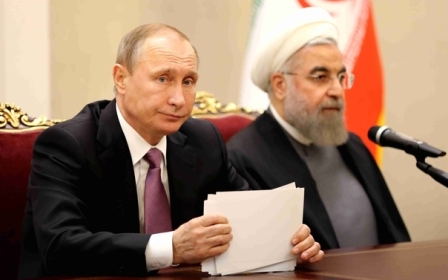ANALYSIS: Trump's quest for 'self-glory' drives his foreign policy
US President Donald Trump has defied advisers, ignored allies and made unprecedented moves in global diplomacy as his personal quest for "self-glory" has become the driving force behind Washington's foreign policy, experts say.
At a NATO summit earlier this week, the US president captured headlines for scolding - and occasionally insulting - European allies. In perceived accordance with his "America First" mantra, Trump pressed NATO partners to increase their military spending.
He also slammed European nations for their immigration policies, saying immigrants are "changing the culture" of the continent.
This hostile approach to allies is reflective of Trump's unorthodox foreign policy, analysts say.
Trump has abandoned the Paris climate agreement, moved the US embassy to Jerusalem, nixed the Iran nuclear deal and opened up to North Korea's authoritarian leader. He has pursued foreign policy positions that seem antithetical to the doctrine of his predecessor Barack Obama, which emphasised cooperation with allies and leading from behind.
Christopher Hill, chief adviser to the chancellor in Global Engagement at University of Denver, said Trump likes to do things his way, ignoring the work of those who came before.
"I think it's very important for Mr Trump - for whatever reason - to claim that he has gathered some insight about issues that no one else ever understands," Hill told Middle East Eye in a phone interview last month. "He takes great pride in starting things from zero and even dismantling things."
It is ironic to see an arrangement with North Korea - I can't really call it a deal - held up as a great success, when in fact it has far fewer elements and a lot less specificity than the Iranian deal.
-Christopher Hill, former diplomat
As Trump visits the UK ahead of a summit meeting with Russia's Vladimir Putin in the Finnish capital Helsinki, critics say his search for validation may prove detrimental to US interests.
"I think Trump's personality and his personal feelings on [policy] matters are the driving factors of pretty much everything he does," Stephen Miles, the director of Win Without War, an advocacy group that promotes progressive national security strategies, told MEE.
"It's clear that he's not making decisions based on any sort of objective analysis or the merits of the cases. He is doing things based on his own personal politics, his own personal opinions… and what he thinks is best for him, not what's best for the country."
Miles added that Trump's behaviour is often an "embarrassment" for the United States.
He said that world powers are "laughing" at the US while trying to take advantage of Trump's flaws.
North Korea and Iran
Miles added that Trump loves being feted by foreign dignitaries, and world leaders who want to bring him to their side often put on elaborate shows for him. He cited Saudi Arabia's lavish welcoming party last year.
Indeed, Trump posted a letter sent to him by North Korean leader Kim Jong-un praising his "energetic and extraordinary efforts" to solve the crisis.
Hill, a former diplomat who served as the head of the US delegation to multilateral negotiations with North Korea in 2005 and as ambassador to Iraq in 2010, said Trump did not seem to take advantage of previous rounds of talks with Pyongyang.
More than 13 years ago, North Korea agreed to denuclearise during the "Six-Party" talks, which included South Korea, Japan, China and Russia as well as the US.
Hill, who has published a memoir titled, OUTPOST: A Diplomat at Work, said the summit between Trump and North Korea's Kim failed to provide details or timelines for denuclarisation.
Asked about the guarantees of the Iran deal versus Trump's agreement with Kim, Hill said: "It is ironic to see an arrangement with North Korea - I can't really call it a deal - held up as a great success, when in fact it has far fewer elements and a lot less specificity than the Iranian deal."
Trump trusts his gut, and so he just gets some instinct; he takes whatever action he thinks will satisfy that and then he moves on.
-Marcus Montgomery, Arab Center Washington DC
Miles echoed Hill's comments, saying that Trump appears to be leaving global treaties, including the Paris climate agreement, simply because they were signed by Obama.
Still, how is it that Trump's Republican party, which controls Congress, is allowing the president to advance his personal agenda ahead of that of the nation?
Miles said Republican leaders in Congress are not standing up to Trump even when they know that he is taking actions opposed to US and global interests because they fear the president's popularity within their own political bases.
"What you're seeing is political cowardice."
The Trump doctrine
Marcus Montgomery, a fellow at the Arab Center Washington DC, said it is difficult to pin down a "Trump Doctrine".
"It is less anchored in anything more than just some personal instinct," Montgomery told MEE. "That's why - I think - he just bounces around from issues."
Montgomery predicted that Trump will not revisit the Iran deal, which saw Tehran drastically scale back its nuclear programme in exchange for lifting sanctions.
"Trump trusts his gut, and so he just gets some instinct; he takes whatever action he thinks will satisfy that and then he moves on," Montgomery said.
He said Trump's quest for personal success and "self-glory" seems to be the driving factor of his foreign policy.
Some advocates of Palestinian rights early on saw a glimmer of hope in this trait - that the US president's urge to succeed where others failed might motivate him to push for an acceptable solution to settle the conflict in the Middle East.
But Trump quickly made it clear that he would not antagonise Israel in any way. He appointed a pro-settlement ideologue as ambassador to Israel, moved the US embassy to Jerusalem and cut funding to the UN Palestinian refugee agency, UNRWA.
The administration is working on a peace plan, dubbed "Deal of the Centuries". But the scheme, which does not include East Jerusalem as a part of a future Palestinian state, has already been rejected by Palestinians.
Montgomery said Trump had the potential to extract concessions for Israel and present a viable solution to the conflict because of his "unorthodox way of doing things" and clout among Republicans who control Congress.
"But now, it almost looks like the White House is creating a plan that is meant to fail, so they can blame it on Palestinians and move on," he said.
Middle East Eye propose une couverture et une analyse indépendantes et incomparables du Moyen-Orient, de l’Afrique du Nord et d’autres régions du monde. Pour en savoir plus sur la reprise de ce contenu et les frais qui s’appliquent, veuillez remplir ce formulaire [en anglais]. Pour en savoir plus sur MEE, cliquez ici [en anglais].




